Laurie Eiserloh vs Delia Garza
by Daniel Van Oudenaren and Ken Martin
Career change is nothing new for Delia Garza, a current Austin City Council Member and Mayor Pro Tem, who also has worked as a firefighter, EMT, child support lawyer, and mother. Now Garza wants to try her hand at being the next Travis County Attorney, a position that prosecutes criminal misdemeanors, represents the county and its elected officials in civil litigation, and advises the Travis County Commissioners Court on legal matters.
The Travis County Attorney’s Office employs about 240 legal professionals and runs on an annual budget of about $24 million.

Laurie Eiserloh placed first in the March 3 Democratic Primary with 42 percent of the votes cast for the four candidates. Garza placed second with 39 percent. Mike Denton placed third with 11 percent and endorsed Eiserloh. Dominic Selvera placed fourth with 8 percent and endorsed Garza.
For Eiserloh, the position would represent a big promotion from employee to elected official, but not so much a career change. She has worked as an assistant county attorney since 2010 and currently leads the employment team in the Civil Litigation Division. Before joining the county attorney’s office she served for seven years with the City of Austin as assistant city attorney. Before that she was an assistant attorney general for nearly six years.
The face-off between Eiserloh and Garza was triggered by the forthcoming retirement of David Escamilla, a 17-year incumbent whose term ends December 31. No other party fielded a candidate. The winner of the Democratic Primary runoff on July 14 will become the next County Attorney.
Garza, now in her second term as City Council member, has practiced law for 29 months, while Eiserloh has been doing so for 27 years. But only Garza has held elective office. Throughout her political career she has cast herself as a defender of working class families, a criminal justice reformer, and a representative of a new and more diverse generation of political progressives.
Garza declined to be interviewed for this article. She instead supplied a statement, “Hello, while I appreciate you reaching out, the publication you are writing for has, literally since the first day of my campaign, printed incredibly biased stories about my campaign…I am running for this office to reform a system that treats black and brown people incredibly unfair and harsh and irreparably harms them. Ironically, your publication has time and time chosen to do that to me. I am declining your invitation to do any profile of me and please feel free to print the above statement.” (To see the complete statement, click here.
For her part, Eiserloh is a self-described “Progressive Democrat,” longtime gay rights activist, and a veteran litigator who is board certified in both personal injury trial law and labor and employment law.
In an effort to educate voters about this runoff election, The Austin Bulldog researched the personal and political backgrounds of the two candidates for County Attorney. We used an organized plan to find public records, dig into the history of the candidates, Interview knowledgeable sources, and review relevant information from local news outlets and other publications.
San Antonio roots
Laurie Rayson Eiserloh and Delia Aileen Garza both grew up in San Antonio, but in quite different circumstances. Eiserloh’s father died in 1963, shortly after she was born. Her widowed mother, a teacher, raised her in the upscale Alamo Heights neighborhood. Eiserloh says her mother steered her toward public service, civic engagement, and Democratic politics.
Garza, by contrast, grew up with an involved father, Jose Garza, who continues to support her to this day, most recently donating $1,200 to help her bid to become county attorney. Her family likewise was “very civically engaged,” according to her official biography on the City of Austin website. Her father worked as a firefighter, while her mother Celia worked in the home.
Garza says her parents encouraged her and her two sisters “to give back and pursue higher education.” At age 20, Delia moved to College Station where she studied for three years, graduating in 1999 with a degree in journalism.
Garza began her public service in Austin soon after that, becoming a firefighter just as her father had been. She served at Fire Station 32 off Bee Caves Road and Fire Station 17 on South 1st Street. During her years on the force, Garza never received an unsatisfactory mark in any of her yearly performance reviews, according to her personnel file from the fire department, obtained by The Austin Bulldog through a public information request.
Billy Brooks, a supervisor at Fire Station 32, praised her as a “hardworking and loyal employee” and Lt. Michael Hollingsworth of Station 17 called her “a proficient EMT and firefighter,” adding, “FF Garza exhibits a healthy interest in furthering her occupational knowledge by asking pertinent questions at on-scene operations, and she is a contributing team player….”
During her firefighting years Garza also gained bargaining experience as a member of the Austin Firefighters Association. She was involved in two cycles of contract negotiations with the City, was elected to the executive board, and was the first woman to chair the firefighters’ political action committee.
Firefighting also gave Garza a street-level view of life in the City of Austin—literally learning a mental map of the streets as a relief driver—while also growing more connected as a citizen and neighbor. As a cadet, Garza lived in Dove Springs, a neighborhood where she served as a mentor at an elementary school, and on the advisory board of a recreation center. As it happens, today, Dove Springs lies within her Council District 2.
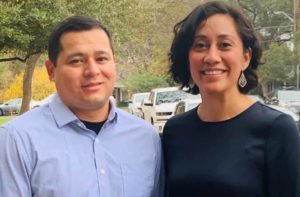
She purchased a home just a few miles west of Dove Springs in the Sweetbriar neighborhood in 2003. Garza has never been wealthy and her parents helped her to buy that home, according to real estate records. Her father gave up his share in the home in 2013. Garza still resides there with her husband Ramiro Martinez Jr. and daughter.
Eiserloh the activist
Laurie Eiserloh’s life charted a different course, starting first with graduate studies, activism, and politics, and only then joining the civil service—the opposite of Garza, who started in the fire department, then went to law school, and only afterwards got into politics.
Eiserloh attended Tulane University in Louisiana for her first two years of college 1982-1984, according to a later resume obtained by the Bulldog, then transferred to the University of Texas at Austin, where she graduated with an English degree in 1986, then a law degree in 1990.
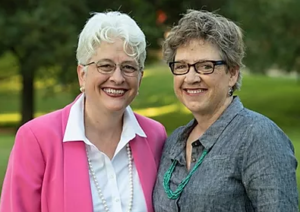
She and her partner, Jessica Ann Chapin, have been together since 1990, the year she graduated law school. They married in 2009 in Provincetown, Massachusetts and have two children, ages 17 and 20.
Soon after graduating, Eiserloh got deep into activism at the Texas Capitol. “In January 1991, my friends and I marched on the state Capitol three times in 10 days: first for lesbian-gay rights, then to oppose the Gulf War, and finally with Ann Richards in the People’s March on the Capitol,” Eiserloh reminisced in a 2007 article for the Texas Observer.
That same year she landed a job with the Lesbian and Gay Rights Lobby of Texas, which today is known as Equality Texas. Within weeks, she took the helm of the organization, after Executive Director Glen Maxey was elected as the first openly gay member of the Texas Legislature. In a recent interview with the Austin-American Statesman, Maxey said, “I thrust her into a public career path really quickly.” Eiserloh worked to defeat several bills, including one that would have included an anti-sodomy statute in the 1993 revised penal code.
Garza’s law school and legal work history
Delia Garza was still a teenager at that point, and she wouldn’t start her own legal training until 18 years after Eiserloh had completed hers.
After leaving the Austin Fire Department, Garza started law school at Gonzaga University in Spokane, Washington, in 2008. During her first year there she held a seven-month internship with the firm Winston & Cashatt, gaining experience in different fields of law, including property, land use, criminal, personal injury and family issues.
She drafted memos to attorneys, client opinion letters, and deposition summaries and pleadings, according to her employment history listed on a later job application, which The Austin Bulldog obtained by public information request. For a few months she also gained experience with Gonzaga University Legal Assistance, which helped her earn course credit.
After graduating law school in May 2010, Garza interned at the Texas Civil Rights Project for 10 months. A later job application says that she drafted legal documents, conducted client interviews, investigated potential cases, and located and interviewed witnesses and experts.
Garza also began to show an interest in politics, working for the Travis County Elections Division for six weeks during the 2011 primary season. Her responsibilities included helping to train volunteers at polling places and helping with equipment inventory and setup.
Garza got her Texas law license in May 2011, within about a year of graduating law school. She tried her hand at running a private practice for a few months, working on family cases, landlord-tenant issues, and probate matters. She also obtained a real estate license in August 2011. The license expired September 30, 2016.
On April 1, 2012, Garza landed more stable employment with the Texas Attorney General’s Office. Initially hired through a temporary staffing service, Garza went on to work for 27 months within the Child Support Division, twice being promoted and ending her service with the title of Assistant Attorney General III in September 5, 2014.
An attorney in that position, according to the job description in her personnel file obtained through a public information request, “Performs moderately complex work…representing the state’s interest in judicial and administrative matters…Works under general supervision, with limited latitude for the use of initiative and independent judgment.”
Eiserloh’s law school and legal work
Eiserloh worked for the Texas Attorney General too, albeit almost 20 years earlier. After dropping her lobbying work in 1993, Eiserloh joined the state agency in November 1993 and worked there until September 1999, nearly six years. The AG’s office no longer has a personnel record of her employment, but Eiserloh detailed her duties in a later job application to the City of Austin.
The records show that from 1993 to 1996 she worked in tort litigation, which involves defending state agencies and state employees in civil personal injury and property damage suits and appeals throughout the state. Eiserloh then moved to employment and civil rights matters from 1996 to 1999. When she left the AG’s office in September 1999 she was deputy chief of the Law Enforcement Defense Division.
Eiserloh joined a private firm in September 1999—Bickerstaff Heath Smiley Pollan Kever and McDaniel—where she handled employment cases at both trial and appellate levels, and mentored new attorneys and law clerks.
Eiserloh left the firm in February 2002. She told The Austin Bulldog that she continued legal work as a private practitioner while pregnant. She said she operated out of her home to draft personnel policies for her church and advise small school districts on personnel matters. She said she was looking for office space and intended to continue in private practice. Then the City of Austin’s Law Department called her to come in for an interview.
She took that job with the City in October 2002. The next month, she and Chapin purchased an historic two-story home in Hyde Park built in 1897, where they still live. The home is valued at more than $1.3 million, according to the Travis Central Appraisal District.
During seven-plus years of work for the city, Eiserloh litigated “high-profile land use, employment, and police cases,” according to a later employment application that she wrote, obtained by the Bulldog through a public information request. She then moved to an advisory role in employment law matters in 2007, “including civil service matters pertaining to the Austin Fire Department” and other departments.
She added, “I assist APD on some of the officer suspension cases.”
Eiserloh moved to the County Attorney’s Office at the start of 2010, writing in her application, “I am a community-oriented person with a long history of dedication to public service.”
Garza’s first campaign
In September 2014 Delia Garza quit her job as assistant attorney general to run for City Council, District 2. When she jumped into the race in 2014, she was a political unknown, but still won praise in local press as the most experienced candidate for the job. “In terms of official experience, Garza holds the best hand,” The Austin Chronicle reported.
“Her time as assistant attorney general provided insight on Austin’s relationship with state government, and her stint with the firefighters union–working successfully for bargaining rights–brings both organizational support and political experience….”
A later Chronicle endorsement echoed these sentiments.
Her platform called for better bus service and affordable housing. She opposed a light rail proposal, Project Connect, which years later she has come to support, albeit in a different form.
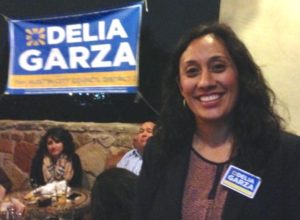
When the District 2 ballots were cast, Garza trounced her opponents, winning 66 percent of the votes, compared to 15 percent for the nearest contender, Edward “Wally” Reyes. He was the only other Hispanic candidate in the race. Sixty-nine percent of the district residents are Hispanic, according to the City of Austin’s District 2 Demographic Profile.
To secure her win, Garza heavily outspent her opponents. According to The Austin Bulldog’s detailed analysis of all campaign spending in the 2014 council elections, Garza spent nearly $51,000 on her campaign. One opponent spent nothing. The other two spent a combined $5,167.
Garza’s council record

Just days before her January 6, 2015, swearing-in, Garza married Ramiro Martinez Jr., a native of Acapulco, Mexico, according to his Facebook profile. He works as an accountant for Onnit, an Austin-based fitness industry company that sells supplements and operates a cafe and yoga studio. Judge Amy Clark Meachum of the 201st District Court performed the marriage, which took place in Caldwell County.

Soon after taking office Garza and her colleague Ellen Troxclair, one of three Republicans on the Council at the time, teamed up to create a Regional Affordability Committee, which has continued to meet throughout Garza’s subsequent years on the council, and which she would chair.
Garza and Troxclair parted ways later that year on a key vote to raise the homestead exemption, a form of property tax relief, which Garza called the “wrong tool” to achieve affordability. She argued that the exemption would impact city services and benefit wealthier council districts more than her own, but she found herself on the losing end of the vote.
Garza’s approach to affordability included support for CodeNEXT, a proposed land development code reform that proponents said would bring more density and, therefore, an increased supply of affordable housing. During her second term, Garza would come to be seen by many council watchers as an advocate for more mass transit and a denser approach to city development.
Her views on transit made her lukewarm toward putting a road bond on the ballot in 2016, a vote on which she abstained. Garza was critical of the bond process and the lack of public transit funding in the bond. Nevertheless a $720 million transportation and mobility bond was approved by 59 percent of the voters in a November 8, 2016 ballot measure.
She also opposed another hike of the homestead exemption in June 2016, casting one of five opposing votes.
In these votes, Garza showed her willingness to buck the mayor and the majority view, even if on other occasions she would go along with them.
‘She got the law wrong’
Garza’s time on the council has not gone without setbacks. She supported two council initiatives that state government or courts later overrode: a requirement for Uber and Lyft to perform fingerprint-based background checks on drivers, and a set of new rules for short-term rentals.
In February 2016, the ride hailing companies tried to strike a compromise with the city. Garza joined with other council members to defeat the proposal. After that, Uber and Lyft initiated petition drive that resulted in putting a proposition before voters May 7, 2016, that would have prohibited required fingerprinting. Despite the companies spending more than $10 million, voters shot down that end-run by defeating the measure 56-44 percent. Uber and Lyft pulled out of Austin and went to the Legislature. Legislation was enacted to throw out Austin’s ordinance. The companies then came back.
Rules imposed by the council on short-term rentals like Airbnb fared no better. They were struck down by the Texas Third Court of Appeals in 2019, on the grounds that they violated the state constitution’s guarantee of freedom of assembly on private property.
Garza found herself on the wrong side of the courts again when she voted to fund a lawsuit against opponents of CodeNEXT, a major land code revision. Because the city insisted property owners were not entitled to individual protest proceedings during an overhaul of the entire city land code, a group of residents filed suit in December 2019. In January 2020, Garza joined a 7-3-1 majority to authorize $121,000 for law firm Scott Douglass & McConnico to defend the city.

District Judge Jan Soifer ruled March 18, 2020, that the city violated the local government code when it failed to individually notify property owners of potential changes to the zoning of their land.
Attack mailers target Garza
Garza’s role in approving litigation against homeowners put her in the crosshairs during her campaign for county attorney. An anti-CodeNEXT group sent out attack mailers headlined, “Wrong on neighborhoods. Wrong on the law.” The mailer cited Judge Soifer’s ruling, asserting, “Garza got the law wrong again and again as a council member. She’s wrong for county attorney!”
Eiserloh disavowed any role in the attack mailers, writing in a Facebook post that she was focused on running a positive campaign, adding, “Now is not the time to tear each other down. Please be kind to one another….”
According to the mailers themselves, they were paid for by Austin Communities First PAC, a group formed specifically to oppose Garza for county attorney. In its two campaign finance reports filed with the Texas Ethics Commission, the PAC raised a grand total of nearly $16,000. In addition to the mailers, it built a website that questions Garza’s qualifications.

Fred Lewis, an attorney associated with the PAC, and one of several who also donated $1,000 to the effort, defended the mailers. In a phone interview with the Bulldog he said, “I don’t know what Laurie’s campaign said about the mailer. We’re independent. We made sure homeowners and neighborhoods knew an accurate record of Garza’s voting record and for that we will not apologize.”
“The truth is not a negative attack ad. The truth is the truth. Everyone knows she is pro-developer, anti-neighborhood, and anti-public input. We made sure voters knew how she stood.”

Mike Lavigne, whose public relations firm gave $5,000 to the PAC, its largest donation, likewise said that he opposed Garza because of her votes on land use, zoning, and development. He told the Bulldog, “She’s clearly a tool for the real estate lobby.”
Negative attacks from the anti-Garza group sparked some backlash at Eiserloh, even though she disavowed the attacks. The Austin Chronicle said in a February endorsement of Eiserloh, “We did pause to reconsider our choice” on account of the negative campaigning. In the runoff, the Chronicle made a dual endorsement.
Garza’s controversial expenses
While Eiserloh was practicing at the County Attorney’s Office, Delia Garza allowed her law license to lapse in 2015, five months after being sworn in as a city council member. In that role, she didn’t need an attorney’s license.
However, ahead of her reelection bid in 2018, Garza sought to renew her license and stirred up a controversy in doing so. In August 2018, the city paid $305 in State Bar dues for Garza to reactivate her license. Government agencies employing attorneys often pay for or reimburse employees for keeping their professional licenses current. It’s questionable whether Garza, as a council member, was eligible.
As reported earlier by The Austin Bulldog, the city also paid $400 for Garza to attend a conference of the Austin Bar Association as a “non-member” in May 2019, $215 for Austin Bar Association dues in June 2019, $240 for state bar dues again in June 2019, and $441 for Spanish classes in Costa Rica.

These expenses prompted an outside ethics investigation, which remains pending, according to a June 9, 2020, email from Brian Molloy, Chief of Investigations for the City Auditor’s Integrity Unit. He sent the email to the complainant in the case, Bill Aleshire, an attorney and outspoken critic of Garza’s candidacy.
Garza responded to criticism of these expenditures in January when the Bulldog first reported on them, saying in a telephone interview, “It’s common for employers to pay for people’s professional licenses whether using it or not. I’m an attorney.”
“If it were not ethical or not allowed, the city would not have paid for it.”
Aleshire also accused Garza of bad ethics last fall when supporters started a “Draft Delia” campaign that allowed her to effectively collect campaign donations before she had appointed a campaign treasurer and announced her run. That campaign collected funds of the Progressive Justice Now PAC, which donated $18,000 to Garza’s county attorney campaign December 30, 2019.
Aleshire called on Garza to resign her council seat while running for county attorney, to avoid conflicts of interest that could arise.
She did not resign. That opened her to ethical concerns because she could accept contributions in unlimited amounts for her county attorney candidacy while participating in matters that might come before the council involving those donors.
Those concerns are heightened when, in just her most recent campaign finance report of July 6, 2020, she accepted contributions such as $5,000 from law firm Armbrust & Brown PLLC, where some of Austin’s foremost lawyer-lobbyists practice on behalf of major developers. Developer Jonathan Coon contributed more than $2,600 to Garza.
Numerous other contributions far exceeded the modest amounts that council members can accept for a reelection campaign. She got nearly $16,000 from Katie Keller of La Jolla, California; $7,000 from Jose Garza Jr. of San Antonio; more than $2,600 each from Robert Lee and Lan Tan, both of Austin; and $2,500 each from Sam Kumar of Austin and VC Holdings QOZ LP of Dallas.
Unlike candidates running for Austin mayor or city council, or those seeking state offices, candidates for county offices do not have to include the principal occupation, job title or employer of donors on campaign finance reports. So it’s not clear what interests these high-dollar donors may have in her candidacy or what business they may have before the City Council.
Criminal justice reforms
Delia Garza was the author of an August 2016 resolution that sought to standardize findings of indigence in Austin Municipal Court. During the campaign, she said that this resolution “led to fewer people being incarcerated for not being able to pay fines,” according to her website.
The resolution directed the City Manager, Presiding Municipal Judge, and Municipal Court Clerk to make certain policy changes, including adopting standard forms to facilitate the evaluation of a defendant’s indigence and enter that finding into the court record.
Garza’s resolution also stated that it would be city policy to “make every effort to avoid committing to jail persons who cannot afford to pay fines…community welfare is undermined when residents who are indigent are jailed for not paying a fine they cannot afford.”
Austin’s municipal judges also serve a role at the county jail when offenders are detained after arrest. Under an interlocal agreement with the county, city judges handle the county’s magistration hearings, which are the first appearance of an arrested person before a judge.
During the campaign for county attorney, Garza led an effort to leverage the city’s influence with the county to force changes to how magistration hearings are handled. This effort sparked backlash from top county officials. As reported by the Bulldog April 10, 2020, Roger Jefferies, the Travis County Executive of Justice Planning, wrote a memo criticizing Garza’s resolution as “incomplete” and, in effect, misleading.
“It is unfortunate that various County stakeholders were not consulted before this proposed resolution was developed. There is information in the resolution that is incomplete,” he said. Despite these criticisms, the council passed the resolution, with 10 votes in favor. Council Member Leslie Pool, who supports Eiserloh’s candidacy, abstained.
For her part, as an assistant county attorney, Eiserloh hasn’t been in a position to enact any policy changes. But she promises that if she wins she’ll enact a 13-point reform plan that would enhance the intake process at the jail to ensure that experienced prosecutors review cases, and reject cases that appear to involve police bias or have poor evidentiary support.
The plan also criticizes Travis County’s “continued reliance on cash bail,” even though some 71 percent of detainees are released on personal recognizance bond. “While being ever mindful of victim safety, I support continued reductions in the use of cash bail in Travis County…excluding those arrested for serious offenses such as family violence and serious or repeat DWI.”
She also advanced a juvenile justice plan to end the “school-to-prison pipeline,” including by expanding restorative justice programs for juvenile offenders, rather than punitive programs.
Views on policing

During the campaign, Delia Garza has cast herself as a criminal justice reformer and touted the endorsement of Chas Moore of the Austin Justice Coalition, a prominent advocate of de-policing and decriminalization.
“I think Delia Garza has proven her commitment to social justice and criminal legal system reform/transformation in her tenure as a City Council member. And I think she is only going to expand on that as county attorney,” Moore said in an email to The Austin Bulldog.
Garza voted with the council in June to rein in police powers in the wake of a weekend of protests in which several people were badly injured. The resolution set in motion plans for budget cuts at the Austin Police Department and prohibited the use of tear gas and rubber bullets.
But Garza wasn’t always a critic or foe of the police; in fact, during her first run for office she secured the endorsement of the Austin Police Association and the Travis County Sheriff’s Law Enforcement Association, and she took $350 from the local police PAC. Neither of those law enforcement PACs appear to have endorsed either county attorney candidate in this election.
Her relationship with law enforcement became more critical over her years on the council. Garza now takes credit for “initiating an investigation into racism and bias in APD.” That audit forced delays to APD cadet classes and ended inconclusively in May.
During council debates in the wake of the recent George Floyd protests, Garza tried to walk a middle path between the harshest critics of police and their defenders, saying, “I honestly believe there’s still a space that exists where you can support your public servants, including police officers, but also believe in police reform.”
But she also advocated for budget cuts, saying at a June 18 meeting, “Unless there is a significant…moving (of) funds, I can’t see myself voting ‘yes’ on a budget.”
Under pressure from activists, Garza also signed a “no cash from cops” pledge, a promise not to accept political donations from the Fraternal Order of Police. Garza’s opponent Laurie Eiserloh likewise signed the pledge. After that, the Austin Police Association asked Garza to return the $700 that she had accepted from its political action committee over the years.
She instead donated that amount to criminal justice advocacy groups. Her latest campaign finance report indicates that on June 17 and 18 she gave $100 to Austin Justice Coalition, $300 to Texas Appleseed, and $301 to Texas Fair Defense Project.
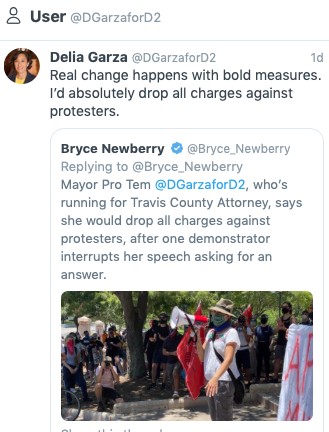
Even as she distanced herself from law enforcement, Garza has courted the support of protesters, and offered to extend rights that go beyond the right to assemble peaceably and make their voices heard. She told protesters at a Black Lives Matter rally July 12, 2020, that she would drop all charges against protesters, according to Bryce Newberry of KXAN News, who covered the event. Garza reiterated the point in a tweet later that day, saying, “Real change happens with bold measures. I’d absolutely drop all charges against protesters.”
In effect she pledged to—before seeing any evidence of possible crimes—grant blanket amnesty for protesters whose alleged misconduct might well result in misdemeanor charges that must be considered by the county attorney’s office.
For example, the Austin American-Statesman reported July 6, 2020, that two people had been arrested by the Department of Public Safety for rioting, resisting arrest, evading arrest, and vandalism. A teenager, whose alleged offense would be handled by juvenile authorities and not the county attorney, was arrested for spray painting the capitol on two different days.
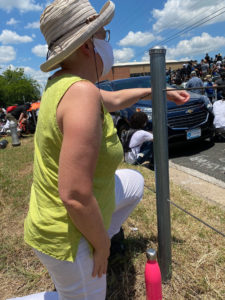
Eiserloh is not unsympathetic to peaceful protests. She attended a Black Lives Matter protest at Huston-Tillotson University in June, after which she wrote in an email to supporters, “I will never forget taking a knee under the hot sun and listening to the almost unspeakable pain of those directly impacted by police brutality.”
Eiserloh has called for police reform, but has not advocated for defunding the police. In an interview, she pointed out that the county attorney’s office doesn’t have power over the police, but added that it could curb police abuses by: rejecting charges where there is evidence of bias, reviewing videos of alleged cases of “resisting arrest,” and referring cases of police brutality to the District Attorney for a civil rights investigation.
“And to the degree that an officer has been untruthful or tampers with evidence, we can place that officer on a ‘do not call’ list. We will not call that officer as a witness,” Eiserloh said.
Race and heritage: Garza the underdog
Garza celebrates her Mexican-American roots and she likes occasionally to reflect Mexican styles in her dress and style. In her official city biography, she mentions being “one of the first Mexican-American women firefighters in the Austin Fire Department,” “the first Latina to serve on the City Council in Austin,” and “the first Latina to serve as Austin’s Mayor Pro Tem.”
Throughout her time on city council, Garza has cast herself also as representative of the underrepresented and a defender of working class families. In her first weeks on the dais, she opposed a proposal to allow Council Members to give up some of their own pay to hire more aides, saying it would put at a political disadvantage “working class people who don’t have supplemental incomes,” discouraging them from seeking office.
She also used her position to campaign for day-care services, better bus service, and other issues of importance to working class families.
Garza has continued to cultivate an underdog persona during the current campaign.
Through the last campaign finance report before the March 3, 2020, Democratic Primary, Eiserloh had raised more than $203,000 to Garza’s $117,000, but also loaned her campaign $115,000. On the July 6, 2020, campaign finance reports, the last before the runoff, Eiserloh listed new contributions of almost $190,000 and Garza lagged at nearly $102,000.
Readers interested in a more complete analysis of spending by all four candidates who ran for county attorney will want to examine The Austin Bulldog’s spreadsheet: Campaign Finance Chart for County Attorney.
Outmatched by her opponent’s fundraising and injection of personal funds to boost her campaign, Garza appealed to supporters on Facebook, saying, “I can’t self-fund my campaign like my opponent can. The only way we beat the powerful status quo in Travis County is by gaining new voters and with small grassroots donations!” (Garza is far less wealthy than her opponent and she carries student debts of about $100,000, according to historical salary data, real estate records, and personal financial disclosures reviewed by The Austin Bulldog).
When criticized for her limited experience practicing law, Garza has pushed back, suggesting on occasion that these criticisms are racially tinged. In a recent Twitter exchange, she responded defiantly to a user who said Garza would only be hired in a junior position at the county attorney’s office: “Not the first time a Latina has been told she’s not qualified. I wonder what level I would have been hired at the City of Austin? Good thing I decided to BANG DOWN the door… Not waiting for your invitation. Ever.”
Similarly, last December 9, after former county judge Bill Aleshire published a letter calling Garza unqualified for the role of county attorney, Garza said in a telephone interview with the Bulldog, “He wouldn’t be the first white man to try to intimidate women of color seeking a leadership position.”
Aleshire responded with a list of women candidates he has supported over the years, including several women of color: Susana Almanza, Margaret Gomez, Ora Houston, and Sally Hernandez. He called Garza’s response a “distraction tactic of the race/gender card.”
(Disclosure: Aleshire represented The Austin Bulldog in two public information lawsuits in 2011. He also represents the Bulldog on public information requests.)
The council member’s identity politics—signified by political activity founded in the shared experience of injustice of members of certain groups—have resulted in pushback on other occasions as well. In a Twitter exchange in January, Garza lashed out at Chris Harris, an African-American criminal justice advocate, when he endorsed one of Garza’s rivals in the Democratic primary. She wrote in a since-deleted tweet, “Thanks Chris. I guess a dude supporting IDEAS resonates more than a woman who actually has…an actual record of implementing actual progressive policy.”
In a follow-up exchange, an Austin woman criticized Garza for making the issue about sex, and Garza responded, “You realize you are a white woman right? We live in a different reality?”
The Austin Chronicle’s Michael King wrote of the exchange, “She’ll likely need a thicker skin to make it through endorsement season….”
Such incidents have led opponents to caricature Garza as entitled and self-absorbed. A political cartoon shared by Mackenzie Kelly, a challenger for District 6 Council Member Jimmy Flannigan, portrays Garza reading a fictional Entitlement Magazine with her own face on the cover.
The criticism is also implicit in the name and URL of an attack website run by Austin Communities First PAC: “Delia Garza 4 Delia Garza.”
Too inexperienced?
The record is clear about which candidate has more legal experience.
But does Garza have so little experience that she actually couldn’t do the job of County Attorney? That’s a claim being advanced by some of her opponents.
In an interview, Austin attorney Fred Lewis said, “She spent three years doing low-level AG work on child support, which is completely irrelevant to what the county attorney does.”
“In short, she has no experience for a very important legal job. Putting inexperienced people in office—we have lot of recent examples—is not a good idea.”
Similarly, former county judge Bill Aleshire stated in a published letter to Garza, “You lack any significant experience actually practicing law that would be necessary to lead a County Attorney’s Office full of real attorneys who are really devoted to practicing law.”
“If you got elected, you would be—demonstrably—the least qualified County Attorney in Travis County’s history. Your ability to lead that law office would be suspect from Day One.”
But Garza has pushed back against such claims. She insists that experience in elective office should be judged as being just as important—if not more so—than experience as a litigator.
On one level, the office of county attorney is apolitical. The county attorney acts as a gatekeeper to decide, based on evidence, which misdemeanor cases to prosecute. The civil law side of the office advises the Travis County Commissioners Court and represents the county and some 50 individual elected officials in lawsuits. But it is the clients, the commissioners court or other elected officials, who decide whether the county attorney will file litigation on their behalf.
The county attorney also manages a multi-million-dollar budget, supervises a staff of hundreds, and makes other administrative decisions.
With two terms under her belt as a city council member, Garza argued that she holds an advantage over Eiserloh in these areas. “The job of county attorney is to be an administrator and policymaker,” she told the Bulldog. “I’m not aware of previous county attorneys practicing in courtrooms while county attorney. They are administrators and policymakers and I bring that experience.” (Garza gave that interview in December for related coverage; she did not grant an interview specifically for this story.)
On her campaign website, Garza noted that as a council member she is “regularly briefed on complex legal issues and, with her council colleagues, advises their legal counsel on the direction they should take.”

Incumbent Travis County Attorney David Escamilla initially wanted to refrain from involvement in campaigns that would decide his successor. But ultimately he endorsed Eiserloh.
His photo is displayed on one of her recent mail pieces, in which he’s quoted saying, “I have served as your County Attorney for 17 years, and I know that Laurie is the best qualified candidate to usher in a new era of reform. Please join me in voting for Laurie Eiserloh.”
County attorney a critical watchdog
Garza’s council experience, however, is a red flag for Mike Lavigne, a donor to the anti-Garza PAC. He argues that the county attorney should serve as a check on the council—not an arm of it.
Commenting on the fact that five council members have endorsed Garza, Lavigne said, “If there is major corruption it will be the county attorney who prosecutes. Why should we care what the council thinks about who’s going to watch over them? I want the person they don’t want to watch over them.”
The county attorney’s responsibility for such oversight is exemplified by an instance in which it came into very public display.
It was County Attorney Escamilla who immediately launched an investigation in January 2011 the same day The Austin Bulldog broke the story of the City Council’s institutionalized practice of violating the Texas Open Meetings Act. The mayor and council members regularly held round-robin, one-on-one and two-on-one private meetings before every public council meeting.
That was a huge scandal reported by every media outlet in Austin. It was a key factor in Kathie Tovo’s 2011 election campaign to challenge and defeat incumbent Randi Shade.
As reported by the Bulldog in October 2012, in concluding that 20-month investigation Escamilla stated the mayor and council had violated the Act by every means possible, including meetings, texts, telephone calls and emails. Each of those elected officials, and their individual criminal defense attorneys, signed deferred prosecution agreements to avoid being charged, tried, and if convicted being sentenced to confinement and forfeiting their elected offices.
High-profile litigation
Whether a county attorney should focus more on routine matters of justice, or on higher questions of politics and policy, is perhaps a matter of legitimate debate. But both candidates, Eiserloh and Garza, have declared that they are open to pursuing larger public policy goals through litigation.
For instance, Eiserloh said in an interview, “Brigid Shea wants to go forward with a climate change initiative.” She was referring to the County Commissioner for Precinct 2, who is supporting her candidacy. All of the commissioners, she added, “have things they want to do…The county attorney’s office provides the legal support to make that happen.”
On her campaign website, Eiserloh stated, “I support Travis County joining other governmental units in litigation against major contributors to climate change.”
Similarly, Garza promised to fight hard for the county in lawsuits against the state: “As a progressive county in a red state, the policies we enact are frequently tampered with and blocked by the overreach of state officials. As County Attorney, I will be prepared to direct my office to push back with all legal means we have against state overreach.”
Litigation against the state is something Eiserloh already has experience with. She helped win a federal lawsuit brought by Attorney General Ken Paxton in 2017 over the so-called “sanctuary city” bill, SB 4—though the win was largely procedural and symbolic.
Just hours after the governor signed into law SB 4, Paxton sued Travis County preemptively in federal court, anticipating that the county wouldn’t comply with the bill and would sue. Paxton asked the court to declare that the new law didn’t violate the 4th or 14th Amendments to the U.S. Constitution.
The suit, Paxton v. Travis County, alleged that Travis County had a policy of refusing to cooperate with federal immigration officials and intended to sue Texas over SB 4’s constitutionality.
“I argued with the team and said the (state) had no standing. Courts have to work on real controversies,” Eiserloh told the Bulldog.
A three-judge panel of U.S. appellate judges agreed, writing in a December 2018 opinion, “States…have a variety of means by which they can enforce their own laws in their own courts.” The court found that the state wasn’t entitled to a “declaratory judgment in advance of a possible injunctive suit.”
In a countersuit, the county claimed that the state law violated constitutional rights and inappropriately curtailed the sheriff’s discretion in administering the law. That argument did not prevail. A federal appeals court upheld all but one clause of the statute. During the controversy, Governor Greg Abbott cut off $1.8 million in state funding for Travis County because recently sworn-in Sheriff Sally Hernandez announced that her office would not comply with some detention requests from U.S. Immigration and Customs Enforcement, The Austin Chronicle reported in March 2017. After the court ruling, Travis County conceded that it would honor federal immigration detainer requests.
Undisclosed affiliation, oil and gas holdings
During research for this article, the Bulldog uncovered an omission in Laurie Eiserloh’s Personal Financial Statement filed February 12, 2020. In that report, she checked a box indicating that she had no board or executive positions. But according to records held by the Texas Secretary of State, Eiserloh was serving on the board of the H.H. Weinert Foundation.
Asked about this, Eiserloh told the Bulldog, “I haven’t heard from Weinert Foundation in a few years and assumed that it had gone inactive.” She also pointed out that the board was not paid.
Eiserloh said, “It was a nonprofit foundation that provided small grants to educational, environmental and other worthy endeavors.” Eiserloh also has been involved in philanthropic work with El Buen Samaritano Episcopal Mission, serving on the board there as well, and volunteered as a team leader and driver for Meals on Wheels.
After being contacted by the Bulldog about her board positions, Eiserloh filed an amendment to her official disclosure statement, listing herself as a board member at El Buen Samaritano, the H.H. Weinert Foundation, and Women on the Border. She also told the Bulldog that she stepped down from the board of the H.H. Weinert Foundation, saying, “With my schedule, I can no longer devote sufficient time to it.”
According to the same financial disclosure form, Eiserloh also has a one-third interest in “royalties” from a roughly 200-acre tract in Karnes County. Karnes County records indicate that the royalties stem from an oil and gas lease, categorized as a “mineral property.” (Mineral rights to land are sometimes bought and sold apart from the actual acreage).
Karnes County Tax Office records indicate the value of Eiserloh’s stake was $8,190 in 2019, and she paid $27.27 in property tax that year. Compared to Eiserloh’s stock and mutual fund holdings, this is a small value, not representing a significant source of the candidate’s wealth.
According to her Personal Financial Disclosure, Eiserloh also owns shares in Chevron (“less than 100”), Conoco Philips (“100 to 499” shares), Exxon Mobile (“100 to 499”), Kinder Morgan, one of the largest energy infrastructure companies in North America (“1,000 to 4,999”), Phillips 66 (“100 to 499”), and Occidental Petroleum (“less than 100”). She does not exclusively invest in energy companies. She also owns shares in various biotech, pharmaceutical, and industrial stocks, as well as mutual funds.
Based on closing prices on Friday, those shares are worth somewhere between $28,682 and $152,834, depending on the exact number of shares owned. PFS forms do not require disclosure of income from shares unless they are sold. The exact numbers of shares are also not reported, just a range of the number of shares.
Garza’s Personal Financial Statement indicates she has less than 100 shares in USCGX, an investment fund that seeks capital appreciation, and no additional assets other that her homestead and a rental unit on the same property.
The Bulldog questioned Eiserloh about her investments in oil and gas, at a time when many in the Democratic Party are critical of that industry, and when Eiserloh herself has made it a plank or her platform to litigate against “major contributors to climate change.”
She said, “I sold the energy stocks back in January (after the deadline for filing the Personal Financial Statement). After Greta Thunberg (a Swedish environmentalist and Time’s 2019 Person of the Year) became more outspoken, I’ve made a number of changes including selling those stocks. The royalties in Karnes County, were bequeathed to me by my mother. They are not currently in production.”
Endorsements and affiliations
During her time on the City Council, Delia Garza has chaired the City’s Regional Affordability Committee and served as vice chair of the Capital Metropolitan Transportation Authority (Capital Metro) board of directors. She also served on the council’s Health and Human Services Committee, Austin Energy Utility Oversight Committee, and Mobility Committee.
Outside of her official duties, Garza sat on the Capital City A&M Club Scholarship Committee. In 2012, she served on the City of Austin’s Charter Revision Committee that recommended the Charter be amended to elect council members from 10 geographic districts. The measure netted 60 percent voter approval in November 2012. It was implemented through the 2014 council elections in which Garza won in District 2.
Garza’s key endorsements in the county attorney race include the Austin Firefighters Association, Austin Travis County EMS, Austin Young Democrats, Central Texas Building Trades, Dove Springs Proud, Education Austin, Hispanic Bar Association of Austin, LiUNA, Local 23 UniteHere!, University Democrats, Workers Defense Action Fund and Working Families Party.
Individuals backing her campaign includeMayor Steve Adler, Council Members Greg Casar, Jimmy Flannigan, Natasha Harper-Madison, and Pio Renteria. Also State Representatives Sheryl Cole, Gina Hinojosa, Celia Israel, and Eddie Rodriguez.
Her website also lists Congressman Joaquin Castro as a supporter. Castro’s office did not respond to a request for confirmation that he made an endorsement, though her latest campaign finance report lists a $1,000 donation from Castro for Congress.
Eiserloh is endorsed by AFSCME local 1624, Austin Environmental Democrats, Black Austin Democrats, Capital Area Progressive Democrats, Central Austin Democrats, Greater ATX National Women’s Political Caucus, IBEW Local 520, LGBT Victory Fund, Liberal Austin Democrats, Pflugerville Democrats, Northeast Travis County Democrats, NxNW Democrats, Stonewall Democrats, West Austin Democrats, and the Austin American-Statesman.
Individual supporters include former State Senator Gonzalo Barrientos; City Council Member Leslie Pool; County Commissioners Margaret Gomez and Brigid Shea; former County Judge Mike Denton, who was the third-place finisher in the March primary; and Nelson Linder, president of Austin NAACP.
Outside of her work as an attorney, Eiserloh is an active member of St. David’s Episcopal Church, and has served on the church’s vestry (board) and attended national conventions of that church
Both Eiserloh and Garza were endorsed by The Austin Chronicle.
What’s at stake
For some voters, an election for a position like county attorney doesn’t mean much. It’s just one of dozens of seemingly obscure ballot choices that they tick off. If this were a general election, the County Attorney would be a “down-ballot” race, one that some voters don’t even bother with.
But the county attorney is no mere functionary. This year especially, the role is at a pivotal place in the public eye, and in public administration. The next county attorney will deal with questions of crime and civil rights, race and bias, protests and pandemic, and political conflicts with the state and other jurisdictions.
What sort of leader do Travis County voters want to help navigate these challenges? The veteran litigator or the veteran councilwoman? A political contender who’s spent years in the limelight or a longtime government worker, who labored for decades in obscurity?
With the departure of David Escamilla, a 17-year veteran, the new county attorney will get to write the next chapter in the continuing evolution of Travis County’s justice system.
This story was updated at 12:50pm July 14, 2020, to include The Austin Bulldog’s Campaign Finance Chart for County Attorney, and to correct a spelling error in Delia Garza’s response to our request for an interview for this story.
Links to related material:
Campaign Finance Chart for County Attorney
Delia Garza’s response to The Austin Bulldog’s request for an interview for this story, July 12, 2020 (1 page)
Trust indicators:
 Bulldog Reporter Daniel Van Oudenaren is a journalist with more than 10 years experience in local, state, and international reporting.
Bulldog Reporter Daniel Van Oudenaren is a journalist with more than 10 years experience in local, state, and international reporting.
 Ken Martin has been covering local government, elections, and politics since 1981. See more about Ken on the About page.
Ken Martin has been covering local government, elections, and politics since 1981. See more about Ken on the About page.
Links to related Bulldog coverage:
Garza wins resolution approval for negotiations on bail reform, April 10, 2020.
Denton endorses Eiserloh for county attorney, March 9, 2020
County attorney candidate a law breaker? February 10, 2020
Garza’s office expenditures questioned, January 29, 2020
Garza for county attorney draws flak, December 9, 2019
An economically diverse city council, June 14, 2015
Two women win without runoffs, November 5, 2014








I need help in drafting a sales agreement. Is this something you handle?
John Russell